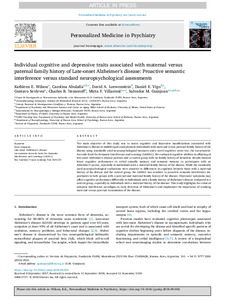Please use this identifier to cite or link to this item:
https://repositorio.uca.edu.ar/handle/123456789/10332| Título: | Individual cognitive and depressive traits associated with maternal versus paternal family history of Late-onset Alzheimer’s disease : proactive semantic interference versus standard neuropsychological assessments | Autor: | Wilsona, Kathleen E. Abulafia, Carolina Andrea Loewensteind, David A. Vigo, Daniel Eduardo Sevlever, Gustavo Nemeroffd, Charles B. Villarreal, Mirta F. Guinjoan, Salvador M. |
Palabras clave: | ENFERMEDAD DE ALZHEIMER; DEPRESION; FUNCION COGNITIVA; EVALUACION PSICOLOGICA; NEUROPSICOLOGIA; TRATAMIENTO PSICOLOGICO | Fecha de publicación: | 2018 | Editorial: | Elsevier | Cita: | Wilsona, K. E., et al. Individual cognitive and depressive traits associated with maternal versus paternal family history of Late-onset Alzheimer’s disease: proactive semantic interference versus standard neuropsychological assessments [en línea]. Postprint del artículo publicado en Personalized Medicine in Psychiatry. 2018, 11. doi:10.1016/j.pmip.2018.09.002. Disponible en: https://repositorio.uca.edu.ar/handle/123456789/10332 | Resumen: | Abstract: The main objective of this study was to assess cognitive and depressive manifestations associated with Alzheimer’s disease in middle-aged asymptomatic individuals with maternal versus paternal family history of the disease using standardly used neuropsychological measures and a novel cognitive stress test, the Loewenstein-Acevedo Scale for Semantic Interference and Learning (LASSI-L). We evaluated cognitive abilities in offspring of late-onset Alzheimer’s disease patients and a control group with no family history of dementia. Results showed lower cognitive performance in verbal episodic memory and semantic memory in participants with an Alzheimer’s parent, especially in individuals with a maternal family history of the disease. While the standardly used neuropsychological evaluations were sensitive to differences in cognition between those with a maternal history of the disease and the control group, the LASSI-L was sensitive to proactive semantic interference impairments in both groups with a paternal and maternal family history of the disease. Depressive symptoms may affect cognitive performance differently in individuals with a family history of Alzheimer’s disease compared to a control group, especially in individuals with a maternal history of the disease. This study highlights the value of semantic interference paradigms in early detection of Alzheimer’s and emphasizes the importance of studying maternal versus paternal transmission of the disease. | URI: | https://repositorio.uca.edu.ar/handle/123456789/10332 | ISSN: | 2468-1717 | Disciplina: | MEDICINA | DOI: | 10.1016/j.pmip.2018.09.002 | Derechos: | Acceso abierto | Fuente: | Personalized Medicine in Psychiatry. 2018, 11 |
| Appears in Collections: | Artículos |
Files in This Item:
| File | Description | Size | Format | |
|---|---|---|---|---|
| individual-cognitive-depressive-traits.pdf | 498,39 kB | Adobe PDF |  View/Open |
Page view(s)
147
checked on Apr 27, 2024
Download(s)
196
checked on Apr 27, 2024
Google ScholarTM
Check
Altmetric
Altmetric
This item is licensed under a Creative Commons License

